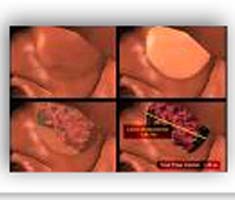Promises shown by 'Virtual biopsy' colonoscopy
 U. S. researchers have said that a "virtual biopsy" colonoscopy might soon be able to determine whether a colon polyp is benign without a biopsy.
U. S. researchers have said that a "virtual biopsy" colonoscopy might soon be able to determine whether a colon polyp is benign without a biopsy.
Currently, colon polyps are extracted during a colonoscopy and sent to a pathologist for examination, which adds time, expense, and some surgical risk, to the procedure, Dr. Michael Wallace of the Mayo Clinic, in Florida, said.
The researchers have reported in the March issue of Gastroenterology that the most advanced of these two devices, the probe-based Confocal Laser Endomicroscopy, is much more accurate than virtual chromoendoscopy, also known as narrow-band imaging. The pCLE -- an imaging tool only one-sixteenth of an inch in diameter -- can magnify a polyp by a factor of 1,000.
It was also found by the study that pCLE was 91 percent accurate in detecting precancerous polyps and narrow-band imaging was 77 percent accurate, when compared to biopsy findings.
Wallace said in a statement, "We are getting closer to where we want to be. Some day soon we will be able to use these probes to virtually biopsy a polyp, removing only those that could become cancerous." (With Inputs from Agencies)